- Home
- Jim Eldridge
Codename Céline Page 6
Codename Céline Read online
Page 6
The trouble was that old ‘me’ had gone, and I knew I would never be her again.
Chapter 12
It was a fortnight after I returned from training that I received a letter from Edward Swinton summoning me to his office at Baker Street. At last! I thought, hoping that I would finally be going on a real mission.
Mr Swinton motioned me to a chair on the other side of his desk.
“I’ve heard good reports about you,” he said.
“Thank you,” I replied.
I waited.
“The instructors tell me you showed a real talent when it came to handling explosives.”
I nodded in reply, but said nothing, waiting. Suddenly he laughed.
“Another thing you’ve got even better at is saying nothing,” he chuckled.
“Trust no one,” I reminded him.
He nodded, and then said in serious tones: “There’s a railway bridge in Normandy we could do with blowing up. Think you can handle it?”
Blowing up a bridge! Real action! Although I did my best to remain outwardly calm, inside I wanted to leap to my feet and give a shout of delight.
“Yes,” I said, keeping my voice cool.
Swinton took a map from a drawer in his desk and unfolded it on a table. It showed the area of Normandy in northern France.
“You’re going to Malerme, a small village just outside Caen,” he said. “The good news is that you won’t have to drop by parachute. The local Resistance have got a couple of fields they use for getting things in and out, and we have the ideal plane for the job: a Westland Lysander, a lovely little machine.”
“What’s the bad news?” I asked.
“The area is crawling with Germans. A lot of their big guns and heavy tanks are based at Caen, so security is tight across the whole area. Constant patrols. That’s one of the reasons you won’t be parachuted in, there’s too big a risk you’ll be blown off course and land where the Germans are.
“Because of the patrols, we won’t know exactly which field you’ll be dropped in. The pilot will head for the general area, and the locals will light signal fires to guide him in.”
“Won’t the Germans spot the fires?”
“The Resistance dig holes in the ground, four of them to form the corners of a box shape, and put wood and paraffin in them. When they set the fires they can be seen from the sky, but not from the ground. Once the plane’s down, they shovel earth in the holes, which puts the fires out.” He smiled. “They know what they’re doing.”
“And this bridge?” I asked.
Swinton pointed to a river on the map that meandered and snaked through the countryside. A railway line crossed the river.
“This railway line is the main one transporting German troops and weapons to their defences on the Normandy coast. Ideally, we’d like it destroyed by the fourth of June.”
“I’ll do it!” I said.
“Good,” Swinton smiled. “In that case, I’ll make the arrangements. Get you fixed up with the right sort of clothes, your documents. I’ve been looking at your record. You spent some time in Rouen?”
“As a child,” I nodded. “My father had an aunt there we used to visit.”
“You know it well?”
“Well enough,” I said.
“When were you last there?”
“Summer, 1938.”
“Six years ago. That’s recent enough. It hasn’t changed much in that time, except for being occupied by Germans. The buildings and streets remain the same. That’ll be your cover story. You’re a student teacher from Rouen who’s come to stay with relatives in Malerme. That way, if anyone talks to you about Rouen, you’ll be able to answer them without getting caught out.
“I’ll leave you to work out what you’ll need in the way of the right kind of explosives and detonator equipment. That’s one of the things you’ve been trained in, after all.” He took a paper file from his desk and handed it to me. “These are for your eyes only, and you can’t take them with you when you go, because if you’re caught and the Germans find them, they’ll identify the target.”
I opened the file and took out a small number of photographs. They were of a bridge crossing a river, taken from different angles.
“People died getting these to us,” he said. “But we’re fairly sure the Germans don’t know it’s the target.”
As I studied the photographs of the bridge, memories of our lectures and practical training in demolition came back to me. Our instructor had been a young man called Ian – although I doubted if that had been his real name.
“Explosives,” Ian had told us, gesturing at an array of chemicals laid out on a table in his metal shed. “Are they dangerous to handle? Nitro-glycerine certainly is, it can blow up if it’s shaken too much. But most explosives are safe enough until a detonator is brought into the equation. The one we use at SOE is this one, called Explosive 808.” He pointed to what looked like six small balls of green plasticine on the table. “Pick it up. Squeeze it in your hand. See what it feels like.”
Like the others, I picked up one of the green lumps, but with a certain wariness. I gave the lump a gentle squeeze. It certainly felt like plasticine. As I squeezed it I caught a smell coming from it, like almonds.
“The best sort of detonator to trigger the explosion is electric cable, which means you can get a good distance from the site of the explosion. A length of plastic-covered cable contains two wires, positive and negative. It’s just like switching on a light: when negative and positive are connected they complete an electrical circuit, which ignites the charge pushed inside the plastic explosive. Bang.”
There had been a lot more, about other ways to set off an explosive charge, and what to do if it didn’t go off. All of it, we were told, was dangerous. That had been the theory. Now, I was about to put it into practice. And though part of me was excited about finally going into action, a large part of me felt very sick and very scared.
Chapter 13
Over the next few days everything was prepared for my mission. At the wardrobe department I was measured and fitted out in clothes suitable for a 17-year-old girl in a small village in Normandy. My hair was cut and shaped in the local fashion, and I was given a pair of slightly worn shoes.
“Wear all of these all the time until you go,” I was instructed. “The dress, the coat, the shoes, you have to look as if you’re used to wearing them.”
My own clothes, even my underwear, were confiscated and taken away from me.
“We can’t take the chance of you accidentally taking any of your own clothes with you. Labels, the design, anything that suggests English clothes could be your death warrant.”
They did, however, give me a thick sheepskin-lined flying jacket and a pair of thick woollen trousers.
“They say you’ll be flying over in a Lysander. Trust me, without these you’ll freeze to death once you get off the ground. Wear them over your ordinary clothes. These will keep you warm in the plane, but you’ll need to dispose of them as soon as you land.”
At the Armoury Department I selected the things I’d need to bring the bridge down: plastic explosives, rolls of electric wire, detonator triggers and wire strippers. I was aware that I’d very likely have to carry these things with me to the bridge, so I had to be careful about getting the weight right. Edward Swinton came with me to the Armoury Department to counter-sign for the equipment I selected. Security, as ever, was tight.
“I’ll have this lot waiting for you at Tempsford Airfield,” he said.
“Where’s that?” I asked.
“It’s in Bedfordshire,” he said. “It’s our own special departure point. You’ll be taken there by car tomorrow afternoon.”
Tomorrow! My mind raced. So soon! Once again, at the thought of actually going, my excitement was mixed with a dreadful feeling of fear. Mr Swinton must
have spotted this, because he asked: “That is alright, isn’t it?”
“Yes, of course,” I said.
“It’s alright to be afraid,” he said gently. “It’s being afraid that helps keep us alive in these situations.”
“Were you afraid?” I asked. Then I silently swore at myself for asking the question. He was my boss! And, for all I knew, he’d never actually been on a mission.
But he looked at me sympathetically and nodded.
“All the time,” he said. “You never stop feeling scared. But you just have to remember what you’re doing it for. We have to win this war, or the Nazis will rule the world. You can tell your aunt that you’re going away on urgent business related to the War.”
“Urgent office filing,” I laughed.
“Tell her she can always contact me if she doesn’t hear from you and gets worried about you,” he said. He handed me a small business card. “The number’s on there.”
“And what will you tell her?” I asked.
“I’ll reassure her,” he said. “That’s what I do. So, at two o’clock tomorrow afternoon a man called Charlie will call and collect you from your aunt’s house.
He produced a thick envelope from his briefcase and handed it to me.
“Here is everything you’ll need to back up your identity as Céline LeBlanc. French ID card. Birth certificate. Ration book. And all authentic. Well, they look authentic. We have the best people producing them.”
“Thank you,” I said, taking the envelope. I didn’t know whether I ought to go through the documents there in front of him, but I had to trust they knew what they were doing. I would look at them later.
Swinton hesitated, then added: “You do know that if you get into serious trouble, we won’t be able to help you. You’re on your own.”
“Yes,” I said.
He held out his hand.
“I wish you good luck,” he said.
I shook his hand. “Thank you.”
……………………………..
That night there was no air raid. Aunt Abbey and I sat in the living room, the blackout curtains pulled shut, the radio on in the background, as she talked about my going off the next day.
“I’m going to miss you, but at least I know you’ll be safe,” she said. “Well, as safe as anyone can be these days. As it’s a government thing, there’s bound to be lots of security.”
“Yes, I’m sure there will be,” I assured her.
“Where is it you’re going, Violet?” she asked.
I smiled. “I’m not allowed to say, Aunt Abbey,” I said. “Not even to you. I’m sorry.”
“But if I need to get in touch with you …”
“That man whose name is on the card I gave you is the one you can call,” I said.
She picked up the card from the sideboard.
“Mr Edward Swinton. Inter-Services Research Bureau.”
“That’s him,” I said.
We listened to the radio a bit longer, a concert of an orchestra playing a selection of popular classical pieces, and then we went to bed.
In my room I opened the envelope Edward Swinton had given me and examined the documents, the proof that I was Céline LeBlanc. Born in Paris. Currently living in Rouen. My photograph stared back at me from the ID card. Everything was stamped with official stamps. There were even a couple of photographs of a little girl who could have been me when I was much younger, with a man and a woman, sitting together on a beach and smiling at the camera. On the back was an inscription in faded ink that said: “Daddy, Mummy and Céline aged 3, Lamor-Plage, Brittany.”
I wondered if there really had been a Céline LeBlanc, and what had happened to her. If there had been, I guessed she was no longer alive. I was now Céline LeBlanc.
Chapter 14
The next afternoon a car arrived at our house to take me away. I carried my small suitcase out of the house, then gave Aunt Abbey a really big strong hug. I wanted so much to tell her that I loved her, and how grateful I was for everything she’d done for me, just in case I didn’t come back. But I couldn’t. I couldn’t say anything important, and not being able to say it broke my heart.
“Take care of yourself,” she said.
“And you,” I replied.
Then I carried my small suitcase to the car and put it in the boot. When we got to Tempsford it would be put into storage to await my return, when I could be Violet Debuchy again. My Céline LeBlanc documents were secure inside my coat.
I looked out of the rear window of the car and saw Aunt Abbey standing on the pavement, waving goodbye, and wondered if I’d ever see her again. Part of me was desperate to go back and stay with her, protect her. But I’d come too far to turn back now.
We drove north out of London and continued going north. Charlie – if that was his name – and I didn’t talk much on the journey. For one thing, we couldn’t really swap any personal stories or details, and we couldn’t talk about where I was going, so we stuck to stuff like the weather, and the radio programmes we’d listened to lately.
After a couple of hours driving, Charlie pulled the car to a halt in a large empty field in a remote part of the Bedfordshire countryside.
“Here we are,” he said. “Tempsford.”
I looked around me, bewildered. There was nothing here! It was just a farmer’s field with a couple of tumbledown derelict buildings, one of which looked like a barn that had been on fire and was now a burnt-out shell, and the other a ruined farmhouse with a collapsed roof that was now just rotten wooden rafters poking up from the half-fallen down walls. On one side of the field were two large piles of hay bales, with a few broken-down tractors and other pieces of farm machinery next to an old, rusty-looking water tank fixed high on some disused scaffolding.
Charlie grinned.
“Clever, isn’t it!” he said.
“Clever?” I echoed. “What’s clever about it? It’s a just an old ruined farm!”
“Yes, that’s what it’s supposed to look like,” he said. “The Germans know there’s an airfield here somewhere, but they haven’t been able to find it from the air. Or even the ground. We’re pretty sure their agents have been searching for it.
“A stage magician created it. It’s all a huge illusion. That burnt-out barn, for example. It’s done with canvas and paint. Inside, it’s a proper control centre with all the best equipment. The same with the old farmhouse. Those rotten timbers are just stage dressing on the top to make it look like the roof’s collapsed.
“That water tank, that’s the control tower. And look at those piles of hay bales. They disguise two hangars, where the planes are kept. We use Westland Lysanders, which are small two-person planes, so they fit inside nicely.”
I sat there in the car looking at the shambles in front of me, astonished. Whoever had created this had done a fantastic job. It looked exactly what it was supposed to look like: a derelict abandoned farm.
Charlie put the car back into gear and drove across the field, pulling up next to the burnt-out barn.
“Here we are,” he said.
I followed him to the broken wooden door, which looked as if it was hanging off one hinge, and was surprised to see when I got up close that this was yet another illusion of clever painting and carpentry. We went into the barn and found ourselves in a small aircraft hangar. A small plane was inside, and a man wearing a thick leather jacket and a flying helmet looked like he was tinkering with the engine.
“Your passenger’s here, Jim!” said Charlie.
Jim stepped away from the plane, ducking under the wing, and came towards us, smiling in welcome.
“Welcome to Fantasy Farm!” he greeted me. He gestured towards the plane. “Just making sure that everything’s in order for the flight. You know the drill?”
“We’ll be flying at night with no lights,” I said. “
You land in a field and I jump out.”
“That’s about it,” nodded Jim. “Hopefully the Germans won’t spot us and shoot at us. The Lysander is a great little flier, but it’s not built for attack by bullets and rockets. They’ll go straight through the outer skin.”
As his words sank in, I felt sick. That was one thing that hadn’t occurred to me, bullets going through the outer skin of the plane and killing us.
I looked at the plane which was painted completely black in the hope it wouldn’t be spotted easily at night. I just hoped it worked.
There were two small cockpits, with a ladder leading up to the rear one.
“That’s where you go,” said Jim. “The ladder’s so you can get down without having to jump too far. We don’t want you damaging yourself.”
“I’ve done parachute training,” I pointed out.
“That may be, but you’d be surprised how many people sprain an ankle jumping just a little distance.” He looked at his watch. “We’ll be heading off as soon as it gets dark, in about an hour.”
“Fine,” I said.
“You know that if there are no fires to guide us in, we’ll have to abandon and come back,” he said. “It’ll mean the Germans are wise to the game. If that’s the case, they might well know we’re coming in, so there could be shooting. But hopefully everything will be alright.” And he gave me a grin, but there was something false about it.
“What’s the matter?” I asked.

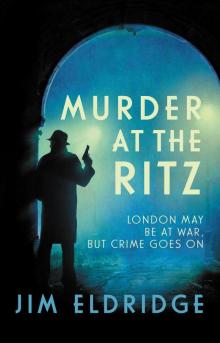 Murder at the Ritz
Murder at the Ritz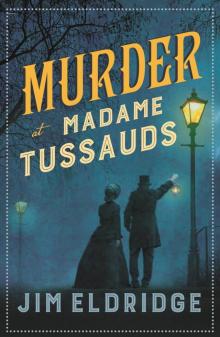 Murder at Madame Tussauds
Murder at Madame Tussauds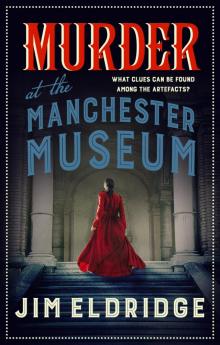 Murder at the Manchester Museum
Murder at the Manchester Museum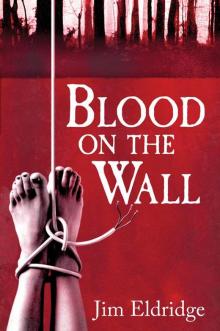 Blood On the Wall
Blood On the Wall 4.3.2.1
4.3.2.1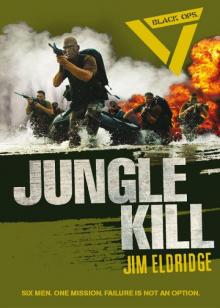 Jungle Kill (Black Ops)
Jungle Kill (Black Ops)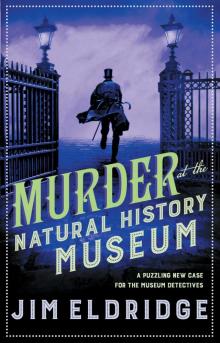 Murder at the Natural History Museum
Murder at the Natural History Museum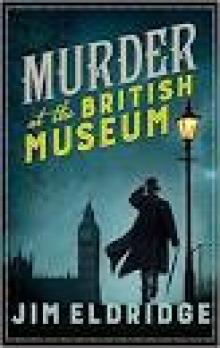 Murder at the British Museum
Murder at the British Museum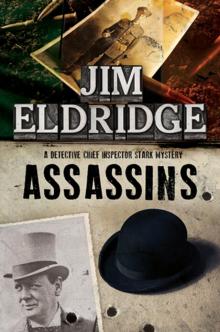 Assassins
Assassins Hunk and Thud
Hunk and Thud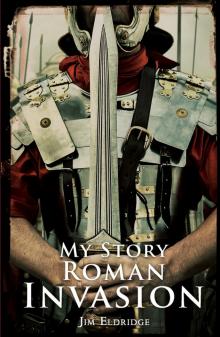 Roman Invasion
Roman Invasion Big Rock and the Masked Avenger
Big Rock and the Masked Avenger The Last Enemy
The Last Enemy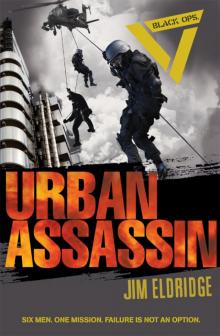 Urban Assassin
Urban Assassin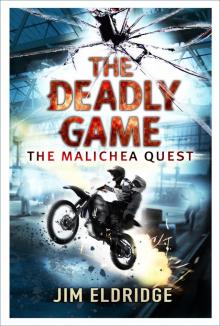 The Deadly Game
The Deadly Game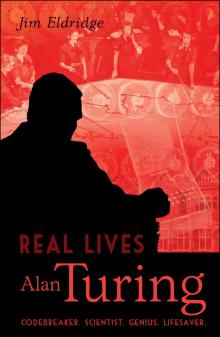 Alan Turing
Alan Turing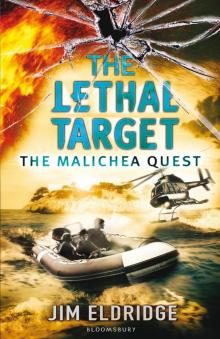 The Lethal Target
The Lethal Target The Giant Rumble
The Giant Rumble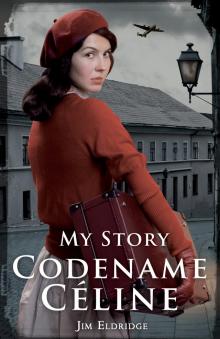 Codename Céline
Codename Céline Death in the Desert
Death in the Desert Escape from Pompeii
Escape from Pompeii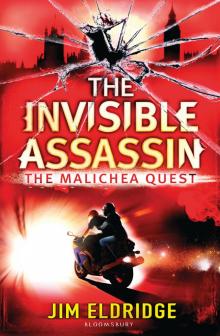 The Invisible Assassin
The Invisible Assassin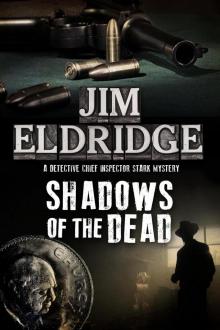 Shadows of the Dead
Shadows of the Dead Jack Versus Veto
Jack Versus Veto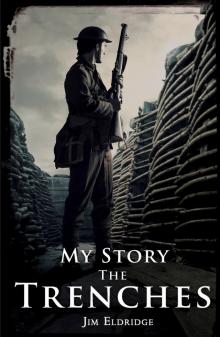 The Trenches
The Trenches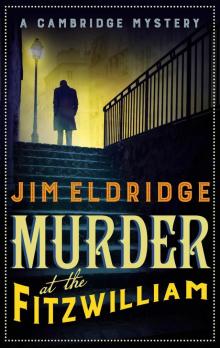 Murder at the Fitzwilliam
Murder at the Fitzwilliam Coming Home
Coming Home